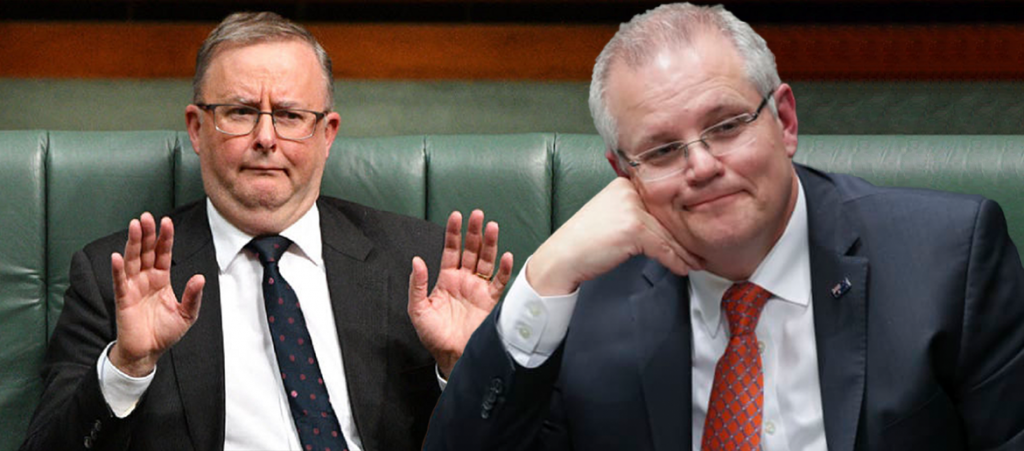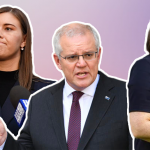
As we get closer to the next Federal election (democracy sausage time!), media coverage of political opinion polls is ramping up too. Is Scott Morrison’s popularity up or down? How does Albo compare? And who is being asked these questions, anyway? It’s well worth understanding how the main polls, like Newspoll, work so you can more confidently interpret the media coverage of them.
Read on for a basic primer on how opinion polls work, and find more useful content in our 2022 Election Hub.
Update 26 April: The latest Newspoll data released today has 53% of the vote going to Labor and 47% to the Coalition (based on preference flows from recent elections).
What political opinion polling systems does the media use?
These are the main political polling players, how they work and where they’re generally published:
Newspoll is owned by Rupert Murdoch’s NewsCorp, with the results published exclusively in The Australian (although other outlets usually pick up the results after publication). This means that The Australian decides on what questions to include in each survey, and the wording of the questions.
The actual surveys are conducted by YouGov, a global market research company that specialises in digital surveys. For each survey, YouGov selects Australians from it’s global database of over nine million people who have signed up to be surveyed on all kinds of topics.
Newspoll sample size is usually around 1500-1600 people per survey.
Guardian Essential Poll is conducted by research company Essential Research, and published exclusively by – guess who? – The Guardian Australia. Essential conducts fortnightly surveys; some questions are asked every time (i.e.: who is your preferred Prime Minister) and others are specific to the news and issues for that particular period.
The Essential sample size is usually around 1000 people.
Resolve Political Monitor (RPM) is a new poll in 2021, conducted by Resolve Strategic and published exclusively in the Sydney Morning Herald and The Age (both owned by Nine Entertainment Co.) Unlike the other polls, RPM does not report on the two-party preferred results (simplified, this is just ‘would you prefer Labor or Liberal?’) in an effort to neutralise the “horse race nature” political reporting.
In the first RPM poll, 2000 Australians were surveyed over the phone and online to set a benchmark for the data. The rest of the polls are monthly 15-minute online surveys to a sample of approximately 1600 people.
Roy Morgan, a market research firm, also conducts political polling with the results available to be published by any outlet. Roy Morgan uses telephone and online interviews, but not on a consistent schedule – this is why it’s not one of the main polls you’ll see in the news.
The last Roy Morgan political poll from Feb 2021 surveyed over 2800 Australians.
The latest Newspoll has Labor ahead of the Coalition 53-47% on a two-party-preferred basis.
Single opinion polls should be taken with a degree of caution but, as the @australian points out this morning, a trend is emerging.#auspol pic.twitter.com/v5PEp68e36
— Michael Rowland (@mjrowland68) September 19, 2021
Who gets polled?
Everybody, sort of. The polling organisations work with the Electoral Councils to understand the demographic makeup of the region they’re surveying, to ensure they are getting the most accurate snapshot possible. For example, if pollsters discovered that 25% of an area was made up by 18 to 30 year olds, they would aim to survey around 25 people from that age bracket out of the 100 people they polled in that area. So whether you personally will be asked for your opinion depends on how many more responses they need in each demographic category, and a little bit of luck!
Historically, polls have been interviews conducted face to face. But as technology evolved, so has the methodology – from in-person interviews to phone surveys, and, as landlines die out, to digital surveys. The move towards digital surveys also makes it easier for you to put your hand up to be included in political polling, by signing up to the services used.
That doesn’t guarantee you’ll be included in the next survey though. Beyond this, political poll organisations are typically quite secretive and vague about how they get their results and who is in each survey. Newspoll is open about the questions they ask participants, whereas the Guardian Essential Poll and Roy Morgan don’t publish this.
Bottom line, can you be part of a poll? Absolutely. If you’re a registered voter you could be randomly contacted to participate in a poll. For slightly better odds, you could register with YouGov here and you could be asked to contribute in the next Newspoll. But ultimately it does come down to chance – only about a few thousand people collectively participate in each political poll, which isn’t much out of the 25 million people living in Australia.
Are political polls accurate?
Yes, and no. Firstly, it’s important to remember that the purpose of polls is not to predict elections (even though Newspoll has a history of predicting the Australia Federal Election results, with the exception of 1993, 2004 and 2019). Polls are surveys that give an idea of how the voters were feeling in the last week or so – it’s just a snapshot of public opinion at one moment in time. So, with that in mind…
Former CEO of Newspoll, Martin O’Shannessy, told the ABC back in 2013 that his polls had a 3 percent margin of error. This means that if 45% of voters in a poll said they would vote for a party, that party would likely get between 42% and 48% of the vote on election day (3% either side).
Australia’s polling is also more likely to be accurate compared to countries that don’t have compulsory voting, like the U.S. Pollsters in countries with voting systems like that also have to predict results based on who is more likely to vote, making it more difficult with more variables at play.
Accuracy of polls also depends on how questions are asked, which could sway the answer given by an interviewee. For example, if asked, “Who has more experience as Prime Minister?” you’re probably more likely to say Scott Morrison, compared to a more open-ended question like, “Who do you think would be a better Prime Minister, Scott Morrison or Anthony Albanese?”
Ultimately it’s in a company’s best interest to remain unbiased and come up with accurate findings, because if they had a reputation as being inaccurate they’d be out of the job pretty quickly. Having said that, public opinion changes everyday, and politics is extremely fickle. Whatever the political landscape looks like today, it could be completely different tomorrow.
Do we even need political polls then?
If polls can’t predict election outcomes, why should we care?
Political polls are the most accurate tool we have for tracking public opinion on many issues like health, climate change and education. Parties use internal and external polls to shape their strategy so they can (in an ideal world) respond better to our needs. Polls and the idea of gauging public opinion rose to prominence as – it’s not only important for helping politicians decide what policies to focus on, but an important pillar of democracy. A political poll is an opportunity for the public to have a say, that could potentially sway political decisions.
Think about it this way; polls exist alongside elections and can have an impact on a party’s policy decisions and strategies, which gives more power to the people (you!) Think about political polls not as a way to predict the future, but as a way to shape it.
Related Posts




